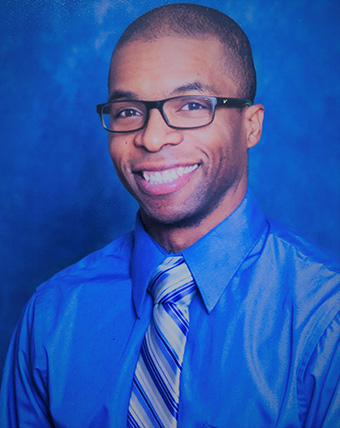People Need A Calming Presence and Steady Leadership

by Stephanie Dulaney ’10
Elected Mayor of Estherville, Iowa in December 2019, Joseph May ’03 made history as the city’s first African American to hold that office. Just three
months into his new role, Joseph also became the city’s first leader to handle the
COVID-19 pandemic.
Originally from St. Louis, Mo., Joseph arrived in Estherville in 2015 when he was
selected to be the pastor of Joy! Fellowship Church there. He and his family got involved
volunteering within the community and fell in love with the city. Serving others has
always been a core component of Joseph’s character, from his decision to major in
theological studies at McKendree to his years of active duty service in the Army as a paralegal at Ft.
Benning, Ga.
![]() "I see my role as mayor as a continuation of service to others."
"I see my role as mayor as a continuation of service to others."
“It is my duty as a Christian and a veteran to help those in need in any capacity
possible. I saw things in my city that I either did not understand or I did not totally
agree with, so I ran for office. After getting into office, I saw the issues from
a different perspective and understood some of the choices that were made. The areas
I still saw a need for improvement, I worked on,” he said.
In addition to mayor, Joseph is also the director of mission services at Avera Holy
Family Health in Estherville, where he trains and leads staff in providing chaplain
services for those in the health care system. When COVID-19 hit the country in early
March, both of his jobs were critically impacted. “It has reshaped some of the services
that my department at Avera provides and caused us to look for new and innovative
ways to provide missional and chaplain services,” he said. “Christ did not give up
on His mission because things got difficult. Instead, He was motivated to press on,
and that is the example I look to in times like these. Finding ways to train, inspire,
and lead others through technology.”
As mayor, Joseph discovered that there was no learning curve when it came to COVID-19
because everyone was unprepared for its scope. He prioritized open and honest communication
above all else, writing weekly letters to community members, giving biweekly radio
addresses, and speaking through video on social media to provide updates and encouragement.
“People need a calming presence and steady leadership,” he said. “I had to learn to
help them on a whole new level.”
That cultivation of dialogue soon became even more important as the nation reeled
from the death of George Floyd in Minneapolis, spurring thousands around the world
to demand an end to racial injustice. Joseph says he used the experience of adopting
his two sons this year as a lesson on seeing life through another’s eyes. “Racial
inequality is a difficult subject for people to talk about because some have experienced
it personally, some are recovering racists, and some do not fully understand it,”
he said. “Much like me and my younger boys, I did not fully understand their pain
or appreciate what they had been through until I saw it through their eyes.”
![]() "We have before us an opportunity to change for the better."
"We have before us an opportunity to change for the better."
Joseph shares that same message of educating oneself on others’ experiences and taking
action through his role in city government. Focusing on six key areas, he says resolution
can be achieved when we take the time to lament with others even when we may not understand
their pain; pray for healing; take action through conversations and education; seek
justice for more than ourselves; be merciful; and practice humility.
“We have before us an opportunity to change for the better,” he said. “But we must
be willing to figure this out together and help people grow. I challenge you to do
more than just post about it on social media; I challenge you to get involved on some
level, whether that is having the conversation in your home, researching the civil
rights movement to understand it, or running for political office to have a greater
impact. Everyone can do something beyond what they have done.”
Make It McKendree
